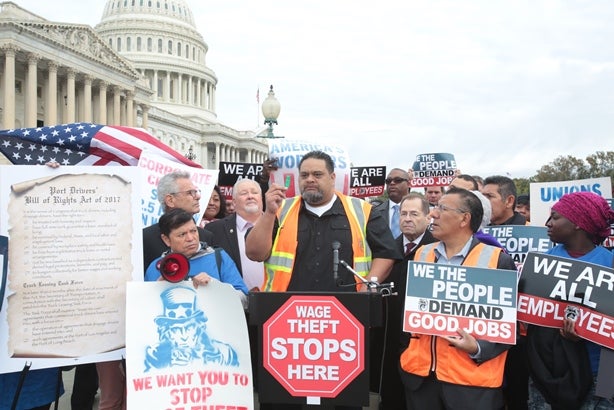News
Relief for Port Truck Drivers

Port truck drivers from coast to coast have for years endured a lack of respect on the job from employers and a lack of understanding from elected officials about how they are exploited. Now, however, lawmakers are taking a step toward changing the landscape for these hardworking Americans.
Teamster leaders and six port drivers came together on Capitol Hill recently to laud the introduction of legislation by Reps. Grace Napolitano (D-Calif.) and Jerrold Nadler (D-N.Y.) that would crack down on the shady practice of truck leasing by port trucking firms, as well as empower ports to improve the environmental conditions at such facilities across the nation.
“Ports are supposed to be an economic engine,” said Fred Potter, International Vice President and Director of the Teamsters Port Division. “And it is for so many. But it’s not for the drivers.”
In the U.S., the port trucking industry consists of more than 100,000 short-run truckers who haul containers on and off the nation’s ports each day. These containers are filled with all of the items that make modern society function but are no longer produced in this country—clothes, electronics, food, housewares and more.
For years, the Teamsters have been shining a light on the issue of misclassification for port drivers. That effort has been intensive at the twin ports of Los Angeles and Long Beach, the main gateway for products made in Asia. While companies and CEOs profit substantially from the sale of those goods, those who help bring them to market are suffering in silence.
Misclassified
Daniel “Seko” Uaina, a driver for Intermodal Bridge Transport, said workers across sectors need to speak out against companies who are taking advantage of them. “Not only do we spend long hours at the port not getting paid, but we take on the overhead for these companies,” Uaina said. “When is it going to stop?”
The Teamsters are optimistic that Napolitano’s “Port Drivers’ Bill of Rights” and Nadler’s “Clean Ports Act” legislation could make a difference.
The former bill would create a taskforce to review the broken system and crack down on bad actors, while the latter would modernize federal trucking rules to empower local ports to address truck pollution and congestion at such facilities.
“These truckers are forced to lease trucks they cannot afford,” Napolitano said. “It is unthinkable that truck companies can get away with this scheme.”